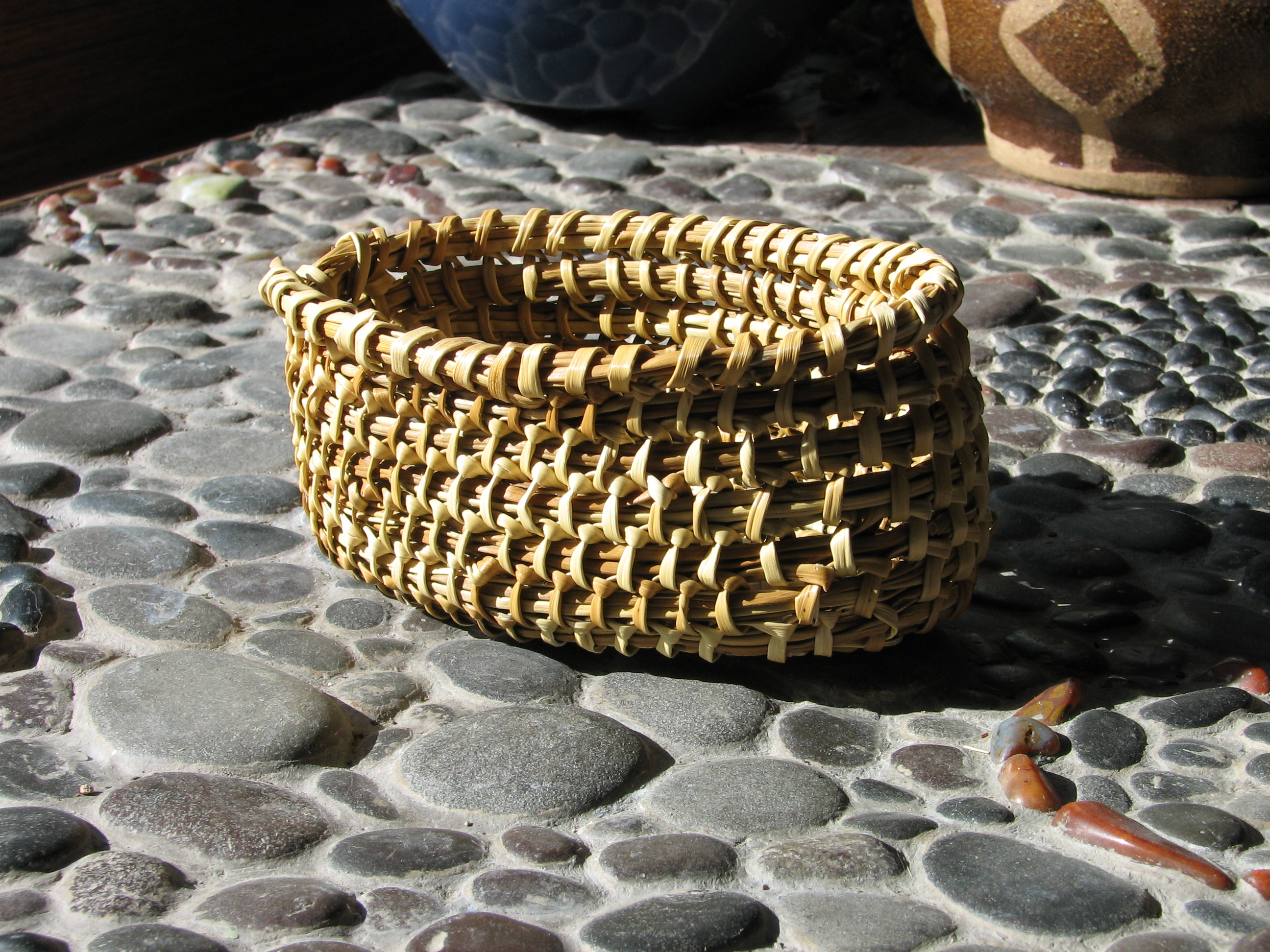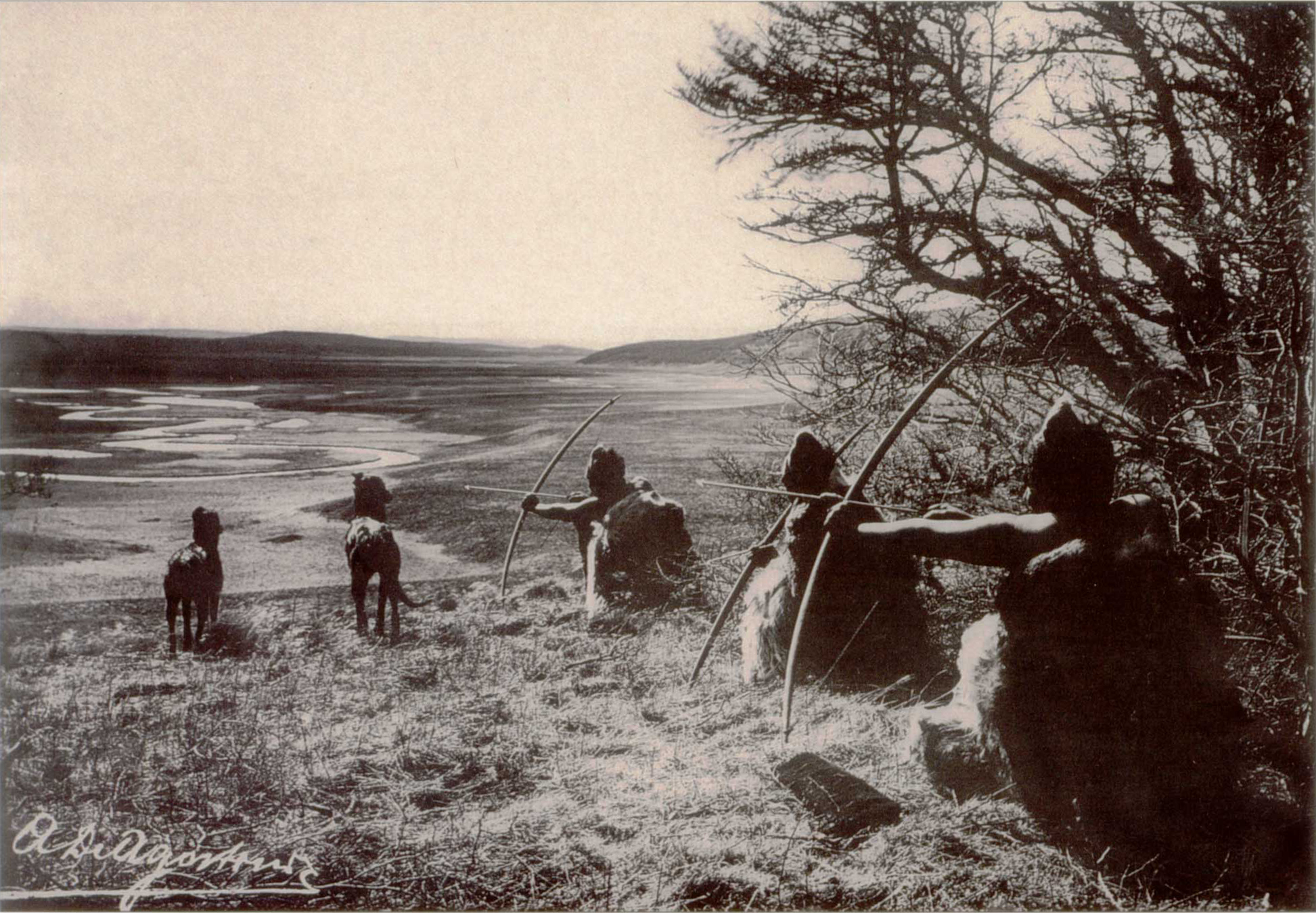|
Kawésqar
The Kawésqar, also known as the Kaweskar, Alacaluf, Alacalufe or Halakwulup, are an Indigenous people who live in Chilean Patagonia, specifically in the Brunswick Peninsula, and Wellington, Santa Inés, and Desolación islands northwest of the Strait of Magellan and south of the Gulf of Penas. Their traditional language is known as Kawésqar; it is endangered as few native speakers survive. It has been proposed that the Caucahue people known from colonial-era records either are ancient Kawésqar or came to merge with the Kawésqar. Etymology The English and other Europeans initially adopted the name that the Yahgan (also known as Yámana), a competing Indigenous tribe whom they met first in central and southern Tierra del Fuego, used for these people: "Alacaluf" or "Halakwulup" (meaning "mussel eater" in the Yahgan language). Their own name for themselves (autonym) is Kawésqar. Economy Like the Yahgan in southern Chile and Argentina, the Kawésqar used to be a nomad ... [...More Info...] [...Related Items...] OR: [Wikipedia] [Google] [Baidu] |
Kawésqar Language
Kawésqar (Qawasqar), also known as Alacaluf, is a critically endangered Alacalufan language spoken in southern Chile by the Kawésqar people. Originally part of a small family, only the northern language remains. In 2009, only a handful of elderly people spoke the language, most of whom lived on Wellington Island off the southwest coast of Chile. Phonology Vowels Consonants Alphabet The alphabet in use has the following letters: a, æ, c, cꞌ, e, f, h, i, j, k, kꞌ, l, m, n, o, p, pꞌ, q, r, rr, s, t, tꞌ, u, w, x. However, differences are reported between dialects, and some sounds are not represented. Morphology and syntax Kawésqar has a complex system of grammatical tense In grammar, tense is a grammatical category, category that expresses time reference. Tenses are usually manifested by the use of specific forms of verbs, particularly in their grammatical conjugation, conjugation patterns. The main tenses found ..., which includes a basic morphological con ... [...More Info...] [...Related Items...] OR: [Wikipedia] [Google] [Baidu] |
Yahgan Language
Yahgan or Yagán (also spelled Yaghan, Jagan, Iakan, and also known as Yámana, Háusi Kúta, or Yágankuta) is an extinct language that is one of the indigenous languages of Tierra del Fuego, spoken by the Yahgan people. It is regarded as a language isolate, although some linguists have attempted to relate it to Kawésqar and Chono. Yahgan was also spoken briefly on Keppel Island in the Falkland Islands at a missionary settlement. In 2017, Chile's National Corporation of Indigenous Development convened a workshop to plan an educational curriculum in the Yahgan language, and in June 2019 it planned to inaugurate a language nest in the community of Bahía Mejillones, near Puerto Williams. The government also funded the publication of a "concise and illustrated dictionary" of the Yahgan language. Following the death of Cristina Calderón (1928–2022) of Villa Ukika on Navarino Island, Chile, no native speakers of Yahgan remain. . 'to take, convey' > , and so on. Present te ... [...More Info...] [...Related Items...] OR: [Wikipedia] [Google] [Baidu] |
Caucahue
Caucahue is an ethonym used by Chonos and the Huilliche and Spanish of Chiloé for a group of canoe-faring people that inhabited the archipelagoes south of the Gulf of Penas. The term is one of the various ethnonyms recorded by the Spanish in the 18th century in the fjords and channels of Patagonia. The Caucahue spoke a different language from the Chono. Archaeologist Ricardo Alvarez posits that the Caucahue and other groups appeared relatively late in colonial records because this was the time when contact became more common. Alvarez also posits the Caucahue disappeared from the historical record by merging into the Kawésqar to the south and the people of Chiloé to the north. According to historian Ximena Urbina and co-workers the Caucahue are essentially ancient Kawésqar. "Caucahues" described in sources as "gigantic" may have been Tehuelches. See also *Antonio de Vea expedition *Caucahue Island *Indigenous peoples in Chile Indigenous peoples in Chile or Native Chile ... [...More Info...] [...Related Items...] OR: [Wikipedia] [Google] [Baidu] |
Strait Of Magellan
The Strait of Magellan (), also called the Straits of Magellan, is a navigable sea route in southern Chile separating mainland South America to the north and the Tierra del Fuego archipelago to the south. Considered the most important natural passage between the Atlantic and Pacific oceans, the strait is approximately long and wide at its narrowest point. In 1520, the Spanish expedition of the Portuguese navigator Ferdinand Magellan, after whom the strait is named, became the first Europeans to discover it. Magellan's original name for the strait was ''Estrecho de Todos los Santos'' ("Strait of All Saints"). The King of Spain, Emperor Charles V, who sponsored the Magellan-Elcano expedition, changed the name to the Strait of Magellan in honor of Magellan. The route is difficult to navigate due to frequent narrows and unpredictable winds and currents. Maritime piloting is now compulsory. The strait is shorter and more sheltered than the Drake Passage, the often storm ... [...More Info...] [...Related Items...] OR: [Wikipedia] [Google] [Baidu] |
Yahgan People
The Yahgan (also called Yagán, Yaghan, Yámana, Yamana, or Tequenica) are a group of Indigenous peoples in the Southern Cone of South America. Their traditional territory includes the islands south of Isla Grande de Tierra del Fuego, extending their presence into Cape Horn, making them the world's southernmost Indigenous human population. In the 19th century, the Yahgan were known in English as "Fuegians." The name is credited to Captain James Weddell, who supposedly created the term in 1822. The term is now avoided as it can also refer to several other Indigenous peoples of Tierra del Fuego, for example the Selkʼnam people, Selkʼnam. The Yahgan language, also known as Yámana, is considered a language isolate. Cristina Calderón (1928–2022), who was born on Navarino Island, Chile, was known as the last full-blooded Yahgan and last native speaker of the Yahgan language. It is now regarded as an extinct language. Most Yahgan now speak Spanish language, Spanish. The Yahgan ... [...More Info...] [...Related Items...] OR: [Wikipedia] [Google] [Baidu] |
Villa Puerto Edén
Villa Puerto Edén is a Chilean hamlet and minor port located in Wellington Island, in Natales commune, Última Esperanza Province, Magallanes Region. It is considered one of Chile's most isolated inhabited places together with Easter Island and Villa Las Estrellas. The village is known for being the home of the last Kawéshkar people. Owing to the large tidewater glaciers caused by the region’s super-high precipitation, it is only accessible by sea, on the Navimag ferry from Puerto Montt in the north, or Puerto Natales in the south. There is also a monthly boat from Caleta Tortel. The population is 176 (2002 census). Owing to the extraordinarily humid climate the village has no roads, with only pedestrian boardwalks connecting the houses and shops. A weekly transport boat takes local fish and shellfish products (the latter mainly mussels) to markets. Margarita Vargas López, a member of the Chilean Constitutional Convention, was born and raised in Villa Puerto Edén. ... [...More Info...] [...Related Items...] OR: [Wikipedia] [Google] [Baidu] |
Little Ice Age
The Little Ice Age (LIA) was a period of regional cooling, particularly pronounced in the North Atlantic region. It was not a true ice age of global extent. The term was introduced into scientific literature by François E. Matthes in 1939. Matthes described glaciers in the Sierra Nevada (U.S.), Sierra Nevada of California that he believed could not have survived the hypsithermal; his usage of "Little Ice Age" has been superseded by "Neoglaciation". The period has been conventionally defined as extending from the 16th to the 19th centuries, (noted in Grove 2004: 4). but some experts prefer an alternative time-span from about 1300 to about 1850. The NASA Earth Observatory notes three particularly cold intervals. One began about 1650, another about 1770, and the last in 1850, all of which were separated by intervals of slight warming. The Intergovernmental Panel on Climate Change IPCC Third Assessment Report, Third Assessment Report considered that the timing and the areas affecte ... [...More Info...] [...Related Items...] OR: [Wikipedia] [Google] [Baidu] |
Wellington Island
Wellington Island is an island west of Southern Patagonian Ice Field, Chile. It has an area of 5,556 km2 and most of the island forms part of Bernardo O'Higgins National Park. It is home to the last Kawésqar people, living in the village of Puerto Edén, the only inhabited place on the island. Climate Puerto Edén has an extremely wet subpolar oceanic climate (Köppen Köppen is a German surname. Notable people with the surname include: * Bernd Köppen (1951–2014), German pianist and composer * Carl Köppen (1833-1907), German military advisor in Meiji era Japan * Edlef Köppen (1893–1939), German author ... ''Cfc'') and is widely reputed to be the place in the world with the highest frequency of rainfall.Lindenmayer, Clem; Trekking in the Patagonian Andes (Lonely Planet Walking Guide); pp. 17-31. See also * Serrano Island, also named ''Little Wellington Island'' References Islands of Magallanes Region {{MagellanAntarctic-geo-stub ... [...More Info...] [...Related Items...] OR: [Wikipedia] [Google] [Baidu] |
Tierra Del Fuego
Tierra del Fuego (, ; Spanish for "Land of Fire", rarely also Fireland in English) is an archipelago off the southernmost tip of the South America, South American mainland, across the Strait of Magellan. The archipelago consists of the main island, Isla Grande de Tierra del Fuego, with an area of , along with numerous smaller islands, including Cape Horn and Diego Ramírez Islands. The western part of the Tierra del Fuego archipelago, about two-thirds including its many islands, is part of Chile, and the eastern part is part of Argentina. The southernmost extent of the archipelago, Cape Horn, lies just north of latitude 56th parallel south, 56°S. The earliest-known human settlement in Tierra del Fuego dates to approximately 8,000 BC. Europeans first explored the islands during Ferdinand Magellan's expedition of 1520. ''Tierra del Fuego'' ("Land of Fire") and similar names stem from sightings of the many fires that the inhabitants built along the coastline and possibly even in ... [...More Info...] [...Related Items...] OR: [Wikipedia] [Google] [Baidu] |
Puerto Natales
Puerto Natales is a city in Chilean Patagonia. It is the capital of both the commune of Natales and the province of Última Esperanza, one of the four provinces that make up the Magallanes and Antartica Chilena Region in the southernmost part of Chile. Puerto Natales is the only city in the province. It is located northwest of Punta Arenas. It is the final passenger port of call for the Navimag ferry sailing from Puerto Montt into the Señoret Channel as well as the primary transit point for travellers to Torres del Paine National Park, Chile. It is located at the opening of Última Esperanza Sound and was originally inhabited by the Kawésqar or Alacaluf people and the Aoniken or Tehuelche people. The first Europeans to visit the area where the city is located were the expeditionaries led by Juan Ladrillero, a Spanish explorer who was looking for the Strait of Magellan's western passage in 1557. The city was settled in the late 19th century by European immigrants, prim ... [...More Info...] [...Related Items...] OR: [Wikipedia] [Google] [Baidu] |
Chungara (journal)
Chunkara ( Aymara for "pointed mountain", hispanicized spellings ''Chuncara, Chuncará, Chungara, Chungará'') may refer to: * Chunkara (Arequipa), a mountain in the Arequipa Region, Peru * Chunkara (Bolivia), a mountain in Bolivia * Chunkara (Puno), a mountain in the Puno Region, Peru * ''Chungará'' (journal), a Chilean academic journal * Chungará Lake, a lake in Chile See also * Chungara–Tambo Quemado * Chunkarani * Hatun Chunkara {{disambig, geo ... [...More Info...] [...Related Items...] OR: [Wikipedia] [Google] [Baidu] |




